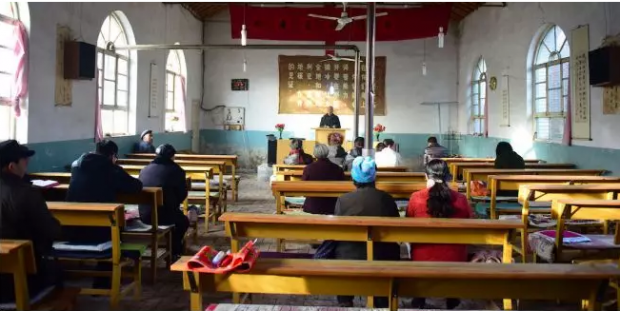It is well known that about twenty years ago most Christians in China belonged to the rural church. However, since the country began to urbanize, the once-bustling rural churches are now increasingly shrinking, which is truly worrying. In addition, the on-going months of suspension of on-site church services caused by the pandemic has had yet a further profound impact on rural churches which have to pay rent, have loan payments or lack sufficient financial resources.
Rural churches are much more vulnerable to the impact of the coronavirus epidemic. So what is the way out for the rural church? Following are thoughts on what I think about the plight and how the rural church can respond. I hope that this will inspire more effective solutions.
I. The concept of innovation (renewal) is reflected in the proverb: "Poverty triggers revolution."
Church leaders must renew their own innate beliefs. They think it proper worship if people gather to sing, praise, pray, and teach, but the outbreak has brought an end to normal worship and online services are becoming the norm. As far as I know, the newly graduated young pastors, once they return to their home churches, are keen to make a difference. However, many of their good suggestions and opinions are not accepted because their church leaders cannot accept new ideas. Over time, young pastors feel so useless and helpless that they quit and move to another church. That is one of the reasons why the rural church is now short of full-time pastors.
II. Establish a church contact group to maintain the fellowship in Christ.
Although many rural believers have moved away so they can make a better living, the fact is that their roots are still in their hometowns. Their home churches remain as their own churches. Their parents and children might still live in their hometowns. They may occasionally return home for a wedding or funeral. Therefore, if the home church gives all the assistance it can to its believers for their living and faith, then this help makes these “bodies of Christ” have a deeper sense of belonging to the "home church". If preachers knew the advantages of modern technology and could use the Web to share the needs of the church, prayer requests, and testimonies with the believers who have left home, then over time, I believe the believers would slowly pay attention to the needs of their "home church".
Rural church leaders must abandon the traditional concept that "donation boxes" represent real donations. Now many people living in the vast rural areas still hold this belief. With modernization, e-commerce technology like WeChat Red Packet, WeChat Transfer, and Ali Pay have made it very easy for believers to donate money online.
I visited a rural church at the end of July last year. Its elders told me most of the congregation moved to the city, but no matter what the situation, most of them return to their home church every Sunday for services. The church gives its clergy "shifts" or "positions" for its routine work. For example, every time the funeral team needs to go out to conduct a funeral service, they prepare a meal at the church. After dinner, the team is provided transportation for its work. No matter whose turn it is to cook, the member will return to the home church to serve the meal, no matter how busy they may be. So they never have any financial pressure or trouble in finding people to serve. These brothers and sisters were all baptized in the name of the Lord Jesus Christ. They are all so well connected that the belief that "my church is forever the home of my brothers and sisters" is deeply rooted in their minds. It is a bit like the membership system of some overseas churches.
III. Pastoral areas (parish) system for centralized administration
The rural church lacks resources and there is a shortage of pastors. This situation is becoming more and more pronounced. Is there a solution? If a county or town were divided into several parishes, then a pastor could serve more than one church. A pastor could be at a different congregation in the morning, afternoon, or even evening (if security was guaranteed), which would provide better financial support for the pastor. This would satisfy both the pastor and the churches at the same time.
IV. Peer help
In a county or city area, there must be some churches with a good financial situation and excellent human resources. In this case, its advantages should be put into full play. In fact, the helper can also help themselves to some extent. Contributing to the church is the lesson that every Christian, and every church that Christ buys with his blood, needs to learn. Whatever circumstances you are in, you should fulfill your obligation through donating funds. Although the power of an individual or the strength of one single church may not be significant, as long as the people are of one mind they can accumulate more.
Finally, the rural church is indeed caught in the midst of constantly dramatic social changes. In spite of all the difficulties they are facing, the Lord can be heard asking Moses, "What is in your hands?". It inspires us to think. Even if the hands have only "a thousand silver talents", it is conceivable that it will also please the Lord. As long as the rural church makes full use of their limited existing resources, and as long as they are not "buried" but are "used to do business" then they will have great value!
- Translated by Charlie Li












